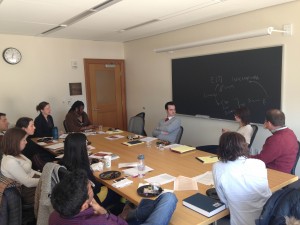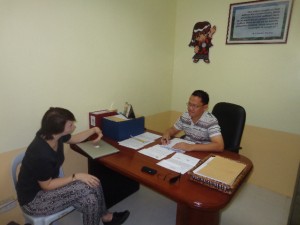To kick off global discussions of MSI Integrity’s report Protecting the Cornerstone, PWYP hosted a panel discussion in Washington, DC on “Multi-stakeholder governance in EITI: opportunities and challenges” on February 12. The lively discussion included an introduction by Eddie Rich, Deputy Head of the EITI International Secretariat, who provoked much discussion with his views on internal governance in EITI. It was followed by testimonials from multi-stakeholder group (MSG) representatives from the Philippines, Democratic Republic of the Congo (DRC), the United States, and other EITI countries, who shared their views on the value and benefits of establishing robust MSG governance processes.
Improving local governance to enhance effectiveness: the low-hanging fruit
“We all expect – and think it is common sense – that corporate and nonprofit boards, as well as government and advisory committees, establish comprehensive governance rules before they begin making decisions. So…,” asked first speaker Amelia Evans (MSI Integrity), “why is this not being done in MSGs”? Good governance processes are even more critical in the complex and novel space of multi-stakeholder decision-making, which has to contend with power imbalances between different stakeholder groups; the likelihood of conflict arising among stakeholders with different interests and backgrounds; the need to manage unique challenges in ensuring that the voices of citizens and communities are included in decisions, and that civil society representatives are legitimate and effective.
Amelia highlighted that these issues can be addressed, if not resolved, by requiring that MSGs have sufficient governance processes. This includes requiring MSGs to consider how they will resolve disputes if the MSG becomes gridlocked, and defining what the EITI Standard requirement that representatives liaise with their constituents means in practice in each national context. Ms Evans pointed out that there needs to be better guidance at the international level, as well stronger enforcement, such as by establishing accessible and effective international grievance mechanisms. Given that many actors in EITI that took part in the study voiced a desire for improved governance, and wanted greater guidance and clarity from EITI, Ms Evans emphasized that these changes are the low-hanging fruits of progress for EITI.
EITI: Presenting the idea of “good-enough governance”
After welcoming the study and the “heroic” undertaking to research MSG governance, Eddie Rich (EITI Secretariat) offered unofficial views about how the report will help inform guidance notes, and inform the Board on how to update the EITI Standard. He noted many of the findings are helpful, pointing in particular to the report’s analysis of per diem practices, and pointed to an EITI blog post with more initial Secretariat reflections on the report.
Mr. Rich then offered views that set the stage for the evening’s spirited discussion and testimonials, arguing that countries do not need to agree to comprehensive governance processes before they release EITI reports. While acknowledging there was no excuse for poor governance, he asserted that requiring detailed governance processes would risk over-institutionalizing EITI processes and creating an enforcement-focused environment, which could undermine national ownership of the EITI process and may potentially diminish interest in joining EITI. Eddie suggested that the goal should not be to ensure robust governance at the outset but instead to aim for “good-enough governance” so that countries can move onto reporting and see “what EITI is about” by producing EITI reports, focus on ensuring good outputs, and adapting over time. His views were largely echoed in the EITI Secretariat response to the report that was released the following week.
Philippines: Establishing comprehensive governance – “it can be done”
According to panelist Tess Tabada, a civil society representative from the Philippines’ MSG, agreeing to good governance rules from the outset was instrumental in ensuring MSG members could work together effectively from the start. Ms. Tabada explained that “the success, in terms of getting the first reports done on time despite limitations, is actually partly because we were very clear on how we will operate. We agreed from the very start.”
Then Ms. Tabada recounted the inspirational story of how civil society held regional meetings and spread the word of EITI throughout the country before selecting their own representatives and set governance rules for themselves and the MSG. The process and outcomes, including specifying expertise, independence, and diversity criteria for representatives, is included in MSI Integrity’s Guidance Note for Civil Society as a case study of innovative good practice. These early efforts have paid dividends in benefits due to the legitimacy and credibility of the MSG representatives, and the EITI process in general.
Emphasizing that “the bottom line is that it can be done”, Ms. Tabada explained that if a country was going to embark upon implementing EITI then “you might as well do it correctly”, which means getting governance rules set up appropriately in the beginning. She proclaimed: “it’s not over-institutionalizing, you need governance mechanisms.”
DRC: Without good governance, civil society is doomed
Then Jean-Claude Katende, a civil society representative in the DRC MSG, took the floor and explained how written internal governance rules in the DRC (règlement intérieur) had enabled him to ensure his voice as civil society was heard in the MSG. Mr. Katende gave colorful examples of unproductive conflicts that had been avoided by being able to turn to the rules and show how the MSG had agreed decisions must be made. He also agreed with the report’s recommendation that there needs to be greater accountability for MSGs to meet their requirement to liaise with their constituents. Mr. Katende shared that the legitimacy and effectiveness of civil society participation on the MSG has improved due to a decision to be more consultative with other civil society throughout DRC, especially from areas of extractive activity, and also by adopting a civil society code of conduct.
United States: Governance takes time but is critical to “lasting change”
Paul Bugala, who represents investors on the United States MSG, reflected on the healthy tension between the desire to implement EITI quickly, and therefore racing to adopt governance and reporting rules, versus progressing more methodically and issuing reports that lead to lasting change. While identifying that speed capitalizes on the government commitment to EITI by producing reports quickly, he insisted it is important that civil society is authentically involved, and that EITI “is institutionalized in a way that will [ensure it continues] beyond the very admirable commitment of [the Obama] administration to this type of disclosure.” The MSG must also take their time to ensure the content of the report is “responsive enough to the constituencies around the country”, or else — in response to Mr. Rich’s view that reports create the opportunity for public discussion — “the conversations that you are going to have aren’t going to affect lasting change.”
Mr. Bugala also described his experience of using both the EITI Standard and US-EITI terms of reference during MSG discussions to ensure that the requirements were being followed, concluding that “requirements matter” and that these documents are crucial to determining the quality and content of the EITI report.
From the floor: “good-enough governance for whom?”
The lively discussion continued as questions came from the floor, mostly focused on the value of governance in EITI processes. Civil society representatives from Tanzania, Nigeria, and Niger all shared examples from the ground and insights into why they need robust governance processes. Several comments highlighted that the goal of EITI is not just to issue reports, but also to achieve accountability towards citizens – and this requires practicing open and inclusive governance, with special attention to including those most affected by extractive activity.
Brendan O’Donnell, an international EITI Board member from Global Witness, closed a night of great discussion by responding to the idea that ‘good-enough governance’ should be the goal of EITI implementing countries with the question: “good enough for whom?”

 A number of questions were raised about how to ensure that governance rules empowered and facilitated meaningful participation from civil society and grassroots actors, as the actors that are the least well-resourced of the participants in EITI, without affecting their independence or motivation for participating. The discussion also focused on the interaction between local, national and global actors. Questions were asked about how the international organs of EITI could better incentivize or ensure that national and local actors comply with expectations, leading to conversations about the value of rigorous international monitoring and international grievance mechanisms.
A number of questions were raised about how to ensure that governance rules empowered and facilitated meaningful participation from civil society and grassroots actors, as the actors that are the least well-resourced of the participants in EITI, without affecting their independence or motivation for participating. The discussion also focused on the interaction between local, national and global actors. Questions were asked about how the international organs of EITI could better incentivize or ensure that national and local actors comply with expectations, leading to conversations about the value of rigorous international monitoring and international grievance mechanisms.

